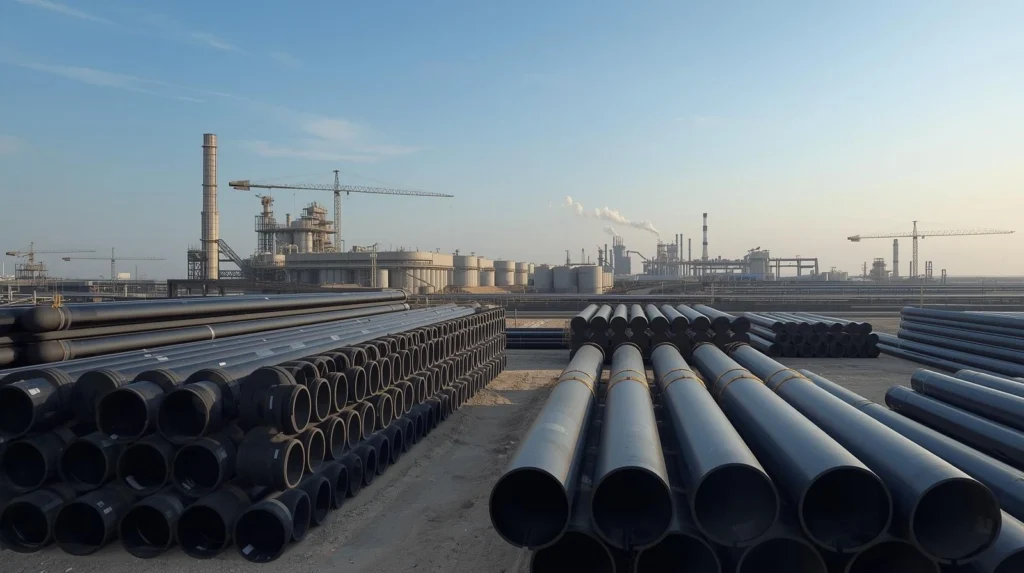In the fast-paced world of industrial growth, one question often arises: How can we ensure the sustainability and efficiency of our infrastructure, especially as industries in Pakistan continue to expand at a rapid rate? The answer lies in High-Density Polyethylene (HDPE) pipes, a material that has revolutionized the way industries manage water supply, drainage, and fluid transport. As Pakistan faces an increasing demand for durable and eco-friendly solutions, HDPE pipes offer a promising path forward.
In this article, we’ll explore how HDPE pipes are becoming a sustainable solution to Pakistan’s growing industrial needs. We’ll look at their benefits, real-world applications, and why they are poised to play a pivotal role in supporting the country’s industrial future.
What Are HDPE Pipes and Why Are They Gaining Popularity?
Understanding HDPE Pipes
HDPE pipes are made from a thermoplastic polymer known for its high strength-to-density ratio. This material makes HDPE pipes exceptionally resistant to corrosion, chemicals, and physical wear, making them ideal for use in a wide range of industrial applications. Unlike traditional materials such as steel or concrete, HDPE offers a lightweight and flexible alternative that is not only cost-effective but also eco-friendly.
Why Are They Becoming Popular?
The growing demand for sustainable infrastructure solutions in Pakistan, especially in industries like agriculture, construction, and water management, has made HDPE pipes an essential component of modern development. Their flexibility, combined with their high resistance to environmental stresses, makes them a top choice for industries that require durable, long-lasting solutions.
How Do HDPE Pipes Benefit Pakistan’s Growing Industrial Sector?
The Key Advantages of HDPE Pipes
1. Durability and Longevity
HDPE pipes have an impressive lifespan, typically lasting over 50 years when properly installed. This longevity is crucial in Pakistan’s industrial environment, where frequent replacements of inferior infrastructure materials lead to significant downtime and costs.
2. Resistance to Environmental Factors
In Pakistan, industries often deal with extreme weather conditions, including heat, flooding, and seismic activity. HDPE pipes are resistant to corrosion and can withstand these environmental challenges better than traditional piping materials, making them ideal for industrial applications in both urban and rural areas.
3. Cost-Effective Solutions
Given that HDPE pipes are more lightweight than other materials, transportation and installation costs are significantly reduced. Moreover, their low maintenance requirements mean that industries save on long-term operational costs.
4. Sustainability and Eco-Friendliness
With sustainability becoming a top priority, HDPE pipes stand out due to their recyclability. Unlike other piping materials, HDPE can be melted down and repurposed, making it an environmentally friendly option for industries aiming to reduce their carbon footprint.
Real-World Applications of HDPE Pipes in Pakistan’s Industrial Sector
Case Study 1: Agriculture and Irrigation
In Pakistan, agriculture is a cornerstone of the economy. HDPE pipes have been widely adopted for irrigation systems across the country. Their flexibility and durability ensure that they can handle the demands of irrigation, even in remote areas where water transport is critical. Additionally, HDPE pipes are resistant to the harsh chemicals found in some fertilizers and pesticides, making them ideal for agricultural applications.
Case Study 2: Water Supply and Drainage
Pakistan’s cities and towns are rapidly expanding, and with this growth comes an increasing demand for efficient water supply and drainage systems. In Lahore, for example, HDPE pipes have been used extensively to upgrade the city’s aging infrastructure. The pipes’ ability to handle both high and low pressures without compromising their integrity has made them a preferred choice for water supply networks and sewer systems.
Case Study 3: Industrial Fluid Transport
For industries dealing with hazardous chemicals and high-temperature fluids, HDPE pipes provide an excellent solution. In Karachi, several manufacturing plants have turned to HDPE piping systems to transport corrosive chemicals safely and efficiently, reducing the risk of leaks and spills.
What Makes HDPE Pipes More Sustainable Than Traditional Alternatives?
Comparing HDPE Pipes with Traditional Materials
Property | HDPE Pipes | Traditional Materials (Steel/Concrete) |
Durability | 50+ years | 20-30 years |
Resistance to Corrosion | Excellent | Poor |
Installation Cost | Low | High |
Maintenance Requirements | Low | High |
Environmental Impact | Low (recyclable) | High (non-recyclable) |
As the table shows, HDPE pipes are a far more sustainable choice compared to traditional materials. Not only do they require less maintenance, but their environmental impact is considerably lower due to their recyclability and longer lifespan.
How Can HDPE Pipes Improve Industrial Efficiency?
Faster Installation and Reduced Downtime
HDPE pipes are easier to transport and install compared to other materials. Their lightweight nature reduces the cost of labor and the time required for installation. This is particularly important for industries in Pakistan, where minimizing downtime can significantly boost productivity.
Reduced Maintenance Costs
Industries that rely on traditional piping materials often face higher maintenance costs due to frequent repairs and replacements. HDPE pipes, on the other hand, have fewer issues with leaks, corrosion, or wear. This translates to less frequent maintenance, which can be a significant cost-saving factor for businesses in Pakistan.
What Role Do HDPE Pipes Play in Pakistan’s Future Industrial Development?
A Critical Part of Infrastructure Development
Pakistan’s industrial sector is poised for growth, and HDPE pipes are set to play a major role in supporting this development. From urban water distribution networks to rural irrigation systems, HDPE pipes offer the resilience and flexibility that modern industries need to thrive.
Meeting Environmental Standards
As Pakistan works to meet global sustainability standards, HDPE pipes are an ideal solution for industries seeking to reduce their environmental footprint. Their recyclability, long lifespan, and low maintenance needs make them a smart choice for businesses looking to align with international environmental goals.
Conclusion: Embracing HDPE Pipes for Sustainable Industrial Growth
As Pakistan’s industrial sector grows, so does the need for sustainable infrastructure solutions. HDPE pipes stand out as a long-term solution, offering durability, environmental friendliness, and cost-efficiency. Their ability to withstand the challenges posed by Pakistan’s diverse environments makes them an ideal choice for industries across agriculture, manufacturing, and urban development.
Investing in HDPE piping systems now can help businesses reduce operational costs, meet environmental standards, and ensure their infrastructure is future-ready.
Frequently Asked Questions (FAQ)
1. What are the main benefits of HDPE pipes for industrial applications?
HDPE pipes are durable, resistant to corrosion, cost-effective, and environmentally friendly. They offer a long lifespan and require less maintenance compared to traditional materials like steel or concrete.
2. How long do HDPE pipes last?
HDPE pipes can last for over 50 years, making them a long-term investment for industries looking for sustainable infrastructure solutions.
3. Are HDPE pipes suitable for agricultural irrigation systems?
Yes, HDPE pipes are ideal for irrigation systems due to their resistance to harsh chemicals, flexibility, and durability, ensuring efficient water transport in agriculture.
4. How do HDPE pipes compare to steel pipes in terms of cost?
HDPE pipes are more cost-effective than steel pipes, both in terms of installation and maintenance. They are lighter, easier to handle, and have a lower risk of leaks.
5. Can HDPE pipes be used for transporting chemicals?
Yes, HDPE pipes are highly resistant to chemicals and are commonly used for transporting hazardous fluids in industries such as manufacturing and petrochemicals.
6. Are HDPE pipes eco-friendly?
Yes, HDPE pipes are recyclable and have a minimal environmental impact compared to traditional materials. Their long lifespan reduces the need for frequent replacements, making them a sustainable option for industrial infrastructure.
7. How do HDPE pipes help reduce maintenance costs in industries?
HDPE pipes are resistant to corrosion and wear, which means they require less frequent maintenance and repairs. This leads to long-term savings for businesses using them for fluid transport or water distribution systems.


